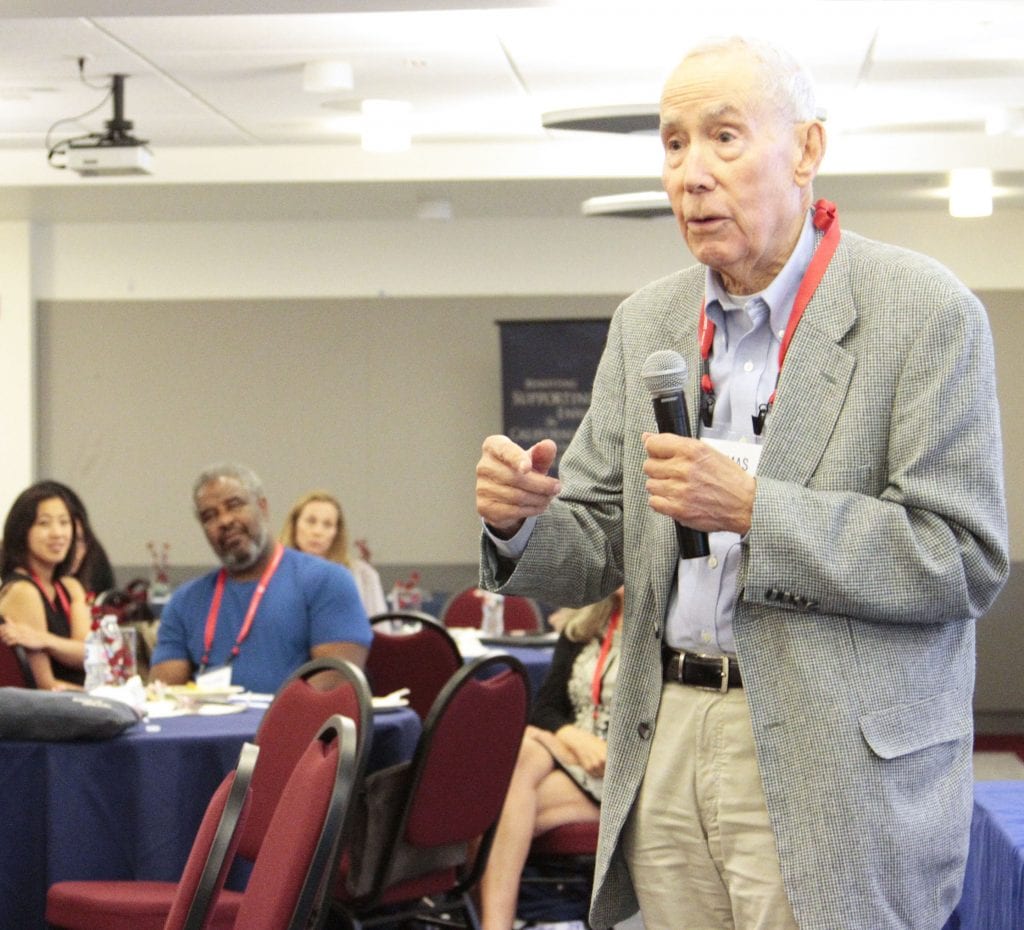In an effort to encourage dialogue on democracy and to prepare community colleges students to be informed citizens, college leaders and students from across the state gathered at College of the Canyons (COC) for the inaugural California Community Colleges Civic Engagement Summit.
The two-day summit titled “Reaffirming the Mission of ‘Democracy’s Colleges’ and Fostering Civic Engagement Across the Disciplines” addressed strategies to increase voter participation, civic knowledge and community volunteerism.
Attendees heard from prominent speakers in the community college and civic engagement fields, and participated in panel discussions and breakout sessions at the Dr. Dianne G. Van Hook University Center.
One of these prominent presenters was keynote speaker Thomas Ehrlich, a consulting professor at the Stanford Graduate School of Education, author of “Civic Responsibility and Higher Education” and co-author of “Educating Citizens: Preparing America’s Undergraduates for Lives of Moral and Civic Responsibility.”
“Over the years I found it important to find ways to engage young people in civic and, in particular, political activities,” said Ehrlich, former president of Indiana University, provost of the University of Pennsylvania and dean of Stanford Law School. “It was enormously important to focus on college students, it’s never too early and it’s never too late.”
Ehrlich’s keynote focused on the gap between civic engagement and political involvement, stressing how community colleges should work to increase political advocacy, public policy and voter participation among their students.
“Schools pride themselves on the civic engagement of their students… A study has shown that less than 1 percent of the service learning courses across the country focus on political engagement. That’s got to change,” Ehrlich said. “This is the time of transition when young people and those a little older can stop and say ‘I can start and make a difference in my community.'”
Ehrlich saw this impact when he began teaching at Stanford University when students fearlessly voiced their opinions and protested the Vietnam War.
“It really did convince me that students could make a difference. I could say unquestionably that it was student activism, young people activism that brought us out of the war,” he said. “Students’ made the difference because they had leaders too that were involved.”
This practice of teachers leading and supporting students in political participation is something Ehrlich hopes to see continued in today’s college culture.
“Students most obviously care about their own lives and their own institutions and the struggles they’re facing and helping them, guiding them to organize effectively on issues where they can really make a difference,” Ehrlich said.

Through his own studies with various organizations, Ehrlich found that promoting political participation had a significant impacts on students’ abilities to be engaged in politics and did not change students’ ideological bias to the right or left.
“The key reason why these students were involved… was that these students had a faculty or staff person as mentor, guider, teacher, they made the difference,” he said.
Ehrlich said he believes this involvement will help students address, what Ehrlich calls, the crisis of today with divisiveness and political polarizations that are negatively impacting various areas—like civil rights, healthcare and environment—in America.
“To deal with that, education isn’t the only issue that we can grapple with but it is, in my view in all odds, the most important one,” he said. “Because if we don’t prepare our students to be responsibly engaged so they know how to deal effectively in public policy issues, it’s not going to happen, that divide is going to stay.”
This idea caused Ehrlich to teach a sophomore seminar called “Democracy and Crisis: Lessons from the Past” to examine key historical events and their impact on American democracy.
“We’re actually looking at a series of pivot points in American democracy through case studies that explore what happened and why through key figures to gain a better sense of how we can grapple with the crises we’re facing today,” he said.
In addition to this effort across community college campuses, Ehrlich hopes to start national initiatives to address digital polarization of information and to integrate curriculums so students in K-12 education with political engagement.
“There is a lot of study about government, and too little study about how you, as an individual, can help others organize and make a difference,” Ehrlich said.
He also hopes to evaluate voter participation on community college campuses to see what environments, including leadership, are doing to promote political engagement.
“One can say if you don’t vote then you won’t be doing much of anything else,” he said.
[email protected]
661-287-5575
On Twitter as @_ChristinaCox_








